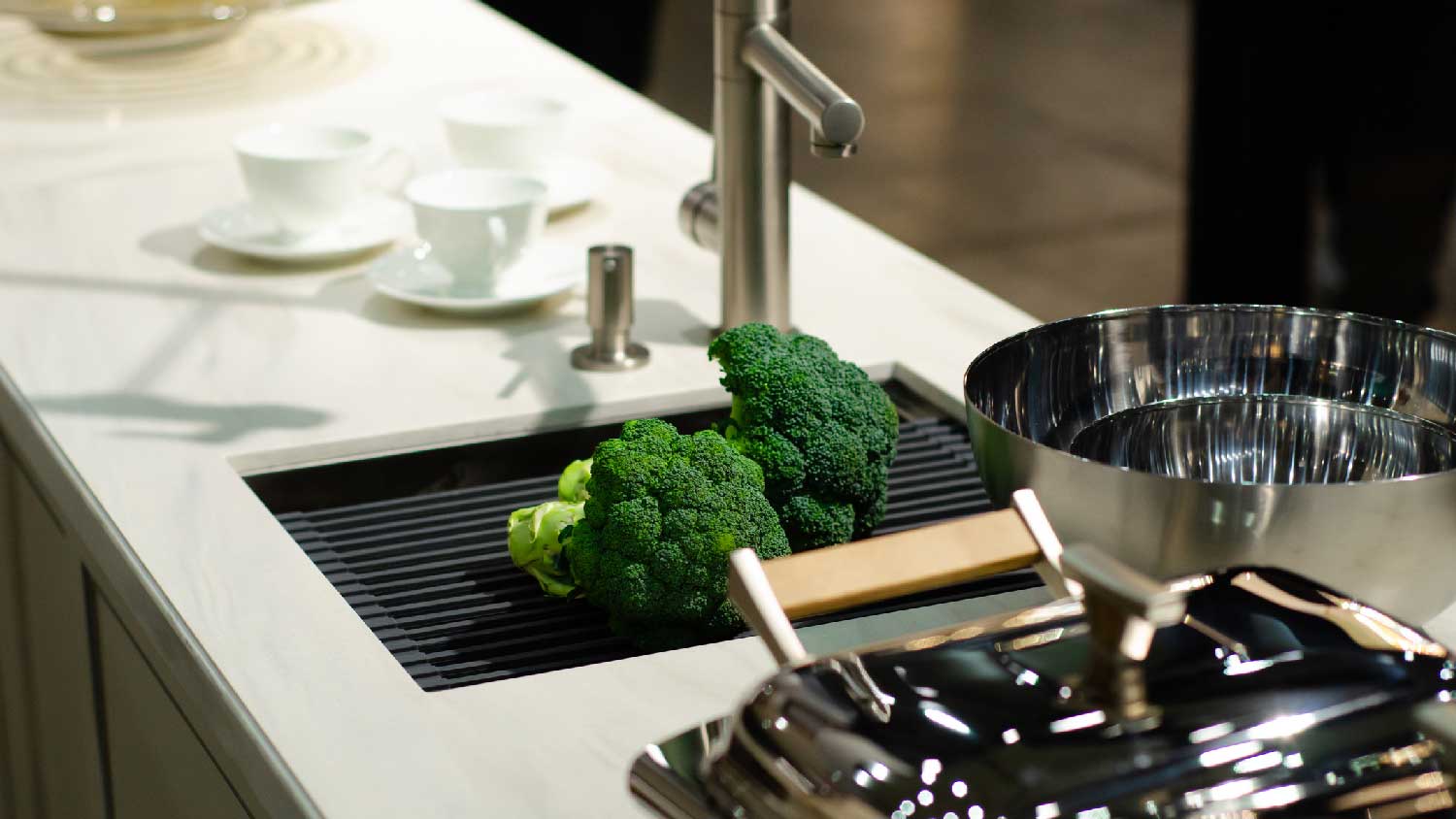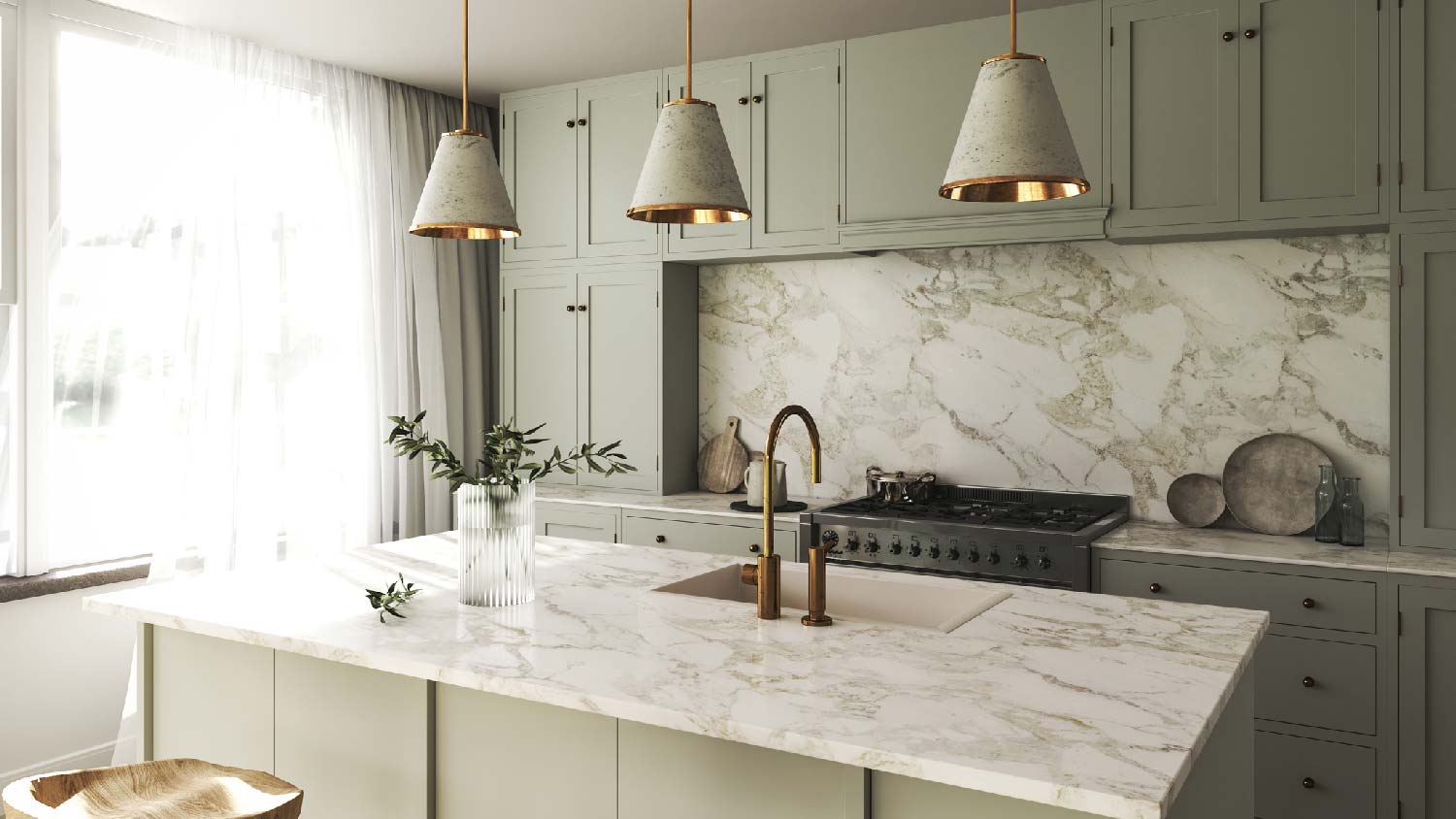Pros and Cons of Limestone Countertops
They add earthy elegance to a kitchen, but they’re high-maintenance


Limestone countertops are known for their veining and earthy hues.
They are typically cheaper per square foot compared to other stone materials.
These countertops are heat resistant, but hot pots and pans can cause damage over time.
Limestone is porous and scratches easily, requiring regular maintenance.
Limestone countertops are known for their natural beauty, but like any material, they have their own advantages and drawbacks. Here, you will find a comprehensive overview of the pros and cons of limestone countertops so you can make the best decision for your abode.
What Are Limestone Countertops?
As the name implies, limestone countertops are surfaces made from limestone, a sedimentary rock composed primarily of calcium carbonate. The material is famous for its natural beauty and unique veining.
However, when you compare granite vs. limestone, the latter is softer and more porous—meaning it is more susceptible to scratches, stains, and damage from acidic items, including red wine. The good news is that proper sealing and regular maintenance will preserve the appearance and durability of limestone countertops.
Pros of Limestone Countertops

These countertops offer several advantages worth considering.
Aesthetic Appeal
Limestone is available in a range of natural and earthy tones that pair well with most types of decor. Its color variations include pure white, off-white, ivory, beige, brown, gray, red, and yellow.
Additionally, limestone's unique fossilization patterns ensure that each piece is one-of-a-kind, similar to other natural stones.
More Affordable
Limestone countertops are cost-effective, typically priced lower per square foot than other stone materials such as granite, marble, and soapstone. This affordability factor makes limestone a desirable choice for those seeking the allure of natural stone without the hefty price tag.
Heat-Resistant
Limestone can withstand heat, allowing you to place a hot pot on the countertop without immediate damage. Its heat resistance makes limestone a practical choice for kitchens.
Cons of Limestone Countertops
While limestone countertops have appealing qualities, there are several drawbacks that potential buyers should consider.
Softer Than Other Stones
One significant con of limestone countertops is their susceptibility to scratches and dents. Limestone is a relatively soft stone compared to other materials like granite or quartz, making it more prone to damage from everyday use, particularly in busy kitchens.
More Porous Than Other Stones
Another drawback is limestone's porous nature, which makes it more vulnerable to stains. In fact, it is more porous than granite and marble. Spills from everyday household items like wine, coffee, or oil can easily seep into the stone if not promptly cleaned, leading to unsightly stains that can be difficult to remove.
Require Regular Maintenance
The material needs regular maintenance to keep it looking its best. This includes frequent sealing to protect the surface from stains and moisture and careful cleaning with pH-balanced products to avoid etching and other damage.
Alternatives to Limestone Countertops

Here are several alternative materials to consider for your countertops, each with its unique benefits and features:
Granite countertops are known for their durability and resistance to scratches and heat, making them a popular choice for countertops in various colors and patterns.
Quartz countertops are non-porous, low-maintenance, and available in many colors and styles, making them a versatile and practical option.
Marble countertops, with their classic veining, provide a luxurious look, though they require more maintenance due to their susceptibility to staining and scratching.
Soapstone countertops are heat-resistant and non-porous. They have a smooth matte finish that darkens with age, adding character over time.
Concrete countertops are customizable in color and texture and have a modern, industrial look. But they require sealing to prevent staining.
Are Limestone Countertops Right for You?
Deciding if limestone countertops are right for you involves evaluating several key factors. Here are some considerations to help you make an informed decision:
Aesthetics: If you love the look of natural stone’s unique patterns and soft, neutral colors, this could be the material for you.
Durability: Limestone is more prone to scratches and dents than other stones, so it may not be the best choice for a busy kitchen.
Maintenance: Limestone’s natural beauty requires regular upkeep; you’ll need to decide if the time and effort is worth it.
Budget: Limestone is a great option if you seek a countertop that’s more affordable upfront.
Frequently Asked Questions
Marble countertops are often considered better than limestone because of their superior durability and luxurious appearance. Marble is harder and less prone to scratching and denting, though it still requires maintenance and sealing to prevent stains and etching. Marble is typically more expensive, but its beautiful veining and range of colors offer a high-end look.
The least porous countertop material is engineered quartz. Made from a blend of natural quartz and resins, it is non-porous and highly resistant to stains, scratches, and bacteria. This makes quartz countertops exceptionally low-maintenance and durable, ideal for kitchens and bathrooms where hygiene and easy upkeep are priorities. Other non-porous options include solid surface materials like Corian, which also offer excellent resistance to moisture and stains.





- Limestone vs. Granite Countertops: What’s the Difference?
- The Top 7 Types of Stone Countertops for Your Kitchen
- 17 Beautiful Granite Countertop Alternatives
- 8 Types of Stones for a Fireplace Surround
- How to Get Stains Out of Different Types of Countertops, From Quartz to Concrete
- 11 Unique and Unusual Kitchen Countertop Ideas
- 9 Low-Maintenance Countertops to Make Your Kitchen Shine
- What’s the Difference Between Concrete vs. Granite Countertops?
- Marble vs. Granite Countertops: How to Pick the Right Stone for Your Home
- The Top 10 Types of Countertop Materials for Your Home










